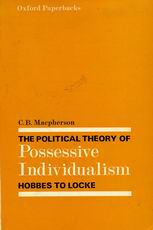
The Political Theory of Possessive Individualism
Hobbes to Locke
Macpherson, C.B.
Publisher: Oxford University Press
Year Published: 1970
ISBN: 19-881084-9
Resource Type: Book
Cx Number: CX6492
A fundamental reinterpretation of political theory from Hobbes to Locke which emphasizes the role of liberal political theory in justifying the appropriation of property to private ownership.
Abstract:
-
Table of Contents
I. Introduction
The Roots of Liberal-Democratic Theory
Problems of Interpretation
II. Hobbes: The Political Obligation of The Market
Philosophy and Political Theory
Human Nature and the State of Nature
Abstraction from Society
The State of Nature
From Physiological to Social Motion
Models of Society:
The Use of Models
Customary or Status Society
Simple Market Society
Possessive Market Society
Hobbes and the Possessive Model
The Inadequacy of the State of Nature
Political Obligation
From Motivation to Obligation
Moral or Prudental Obligation?
The Postulate of Equality
Morality, Science, and the Market
The Presumption of Obligation from Fact
Penetration and Limits of Hobbes's Political Theory
Historical Prerequisites of the Deduction
The Self-perpetuating Sovereign
Congruence of Sovereignty and Market Society
Some Objections Reconsidered
III. The Levellers: Franchise and Freedom
The Problem of the Franchise
Types of Franchise
The Record
The Chronology
Putney and After
Before Putney
Summing-up
Theoretical Implications
The Property in One's Person
The Deduction of Rights and the Grounds for Exclusion
Levellers' and Independents' Individualism
Limits and Direction of the Levellers' Individualism
IV. Harrington: The Opportunity State
Unexamined Ambiguities
The Balance and the Gentry
The Bourgeois Society
The Equal Commonwealth and the Equal Agrarian
The Self-Cancelling Balance Principle
Harrington's Stature
V. Locke: The Political Theory of Appropriation
Interpretations
The Theory of Property Right
Locke's Purpose
The Initial Limited Right
The Limitations Transcended
The spoilage limitation
The sufficiency limitation
The supposed labour limitation
Locke's Achievement
Class Differentials in Natural Rights and Rationality
Locke's Assumption of the Differentials in Seventeenth-
Century England
Differential Rights and Rationality Generalized
Differential rights
Differential rationality
The Ambiguous State of Nature
The Ambiguous Civil Society
Unsettled Problems Reconsidered
The Joint-stock Theory
Majority Rule v. Property Right
The Equation of Individual and Majority Consent
Individualism v. Collectivism
Locke's Constitutionalism
VI. Possessive Individualism and Liberal Democracy
The Seventeenth-Century Foundations
The Twentieth-Century Dilemma
Appendix
Social Classes and Franchise Classes in England, circa 1648
Notes
Works and Editions Cited
Index
Subject Headings


